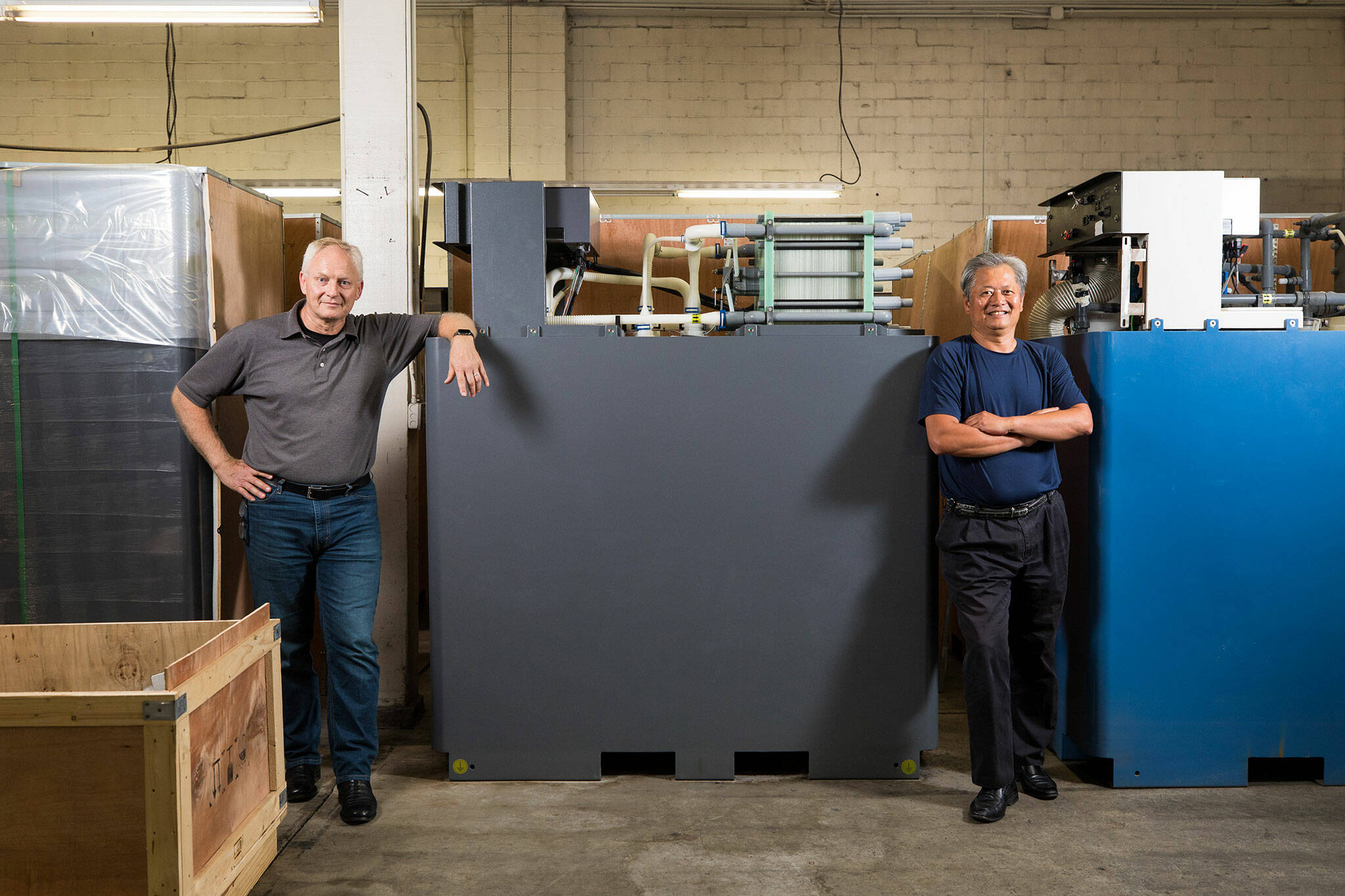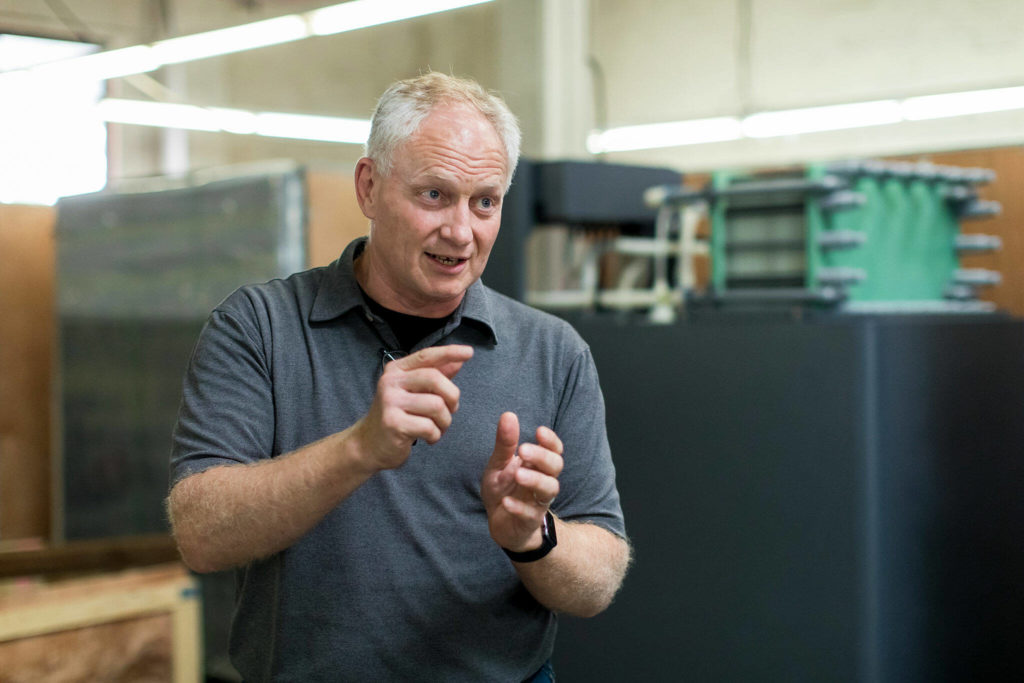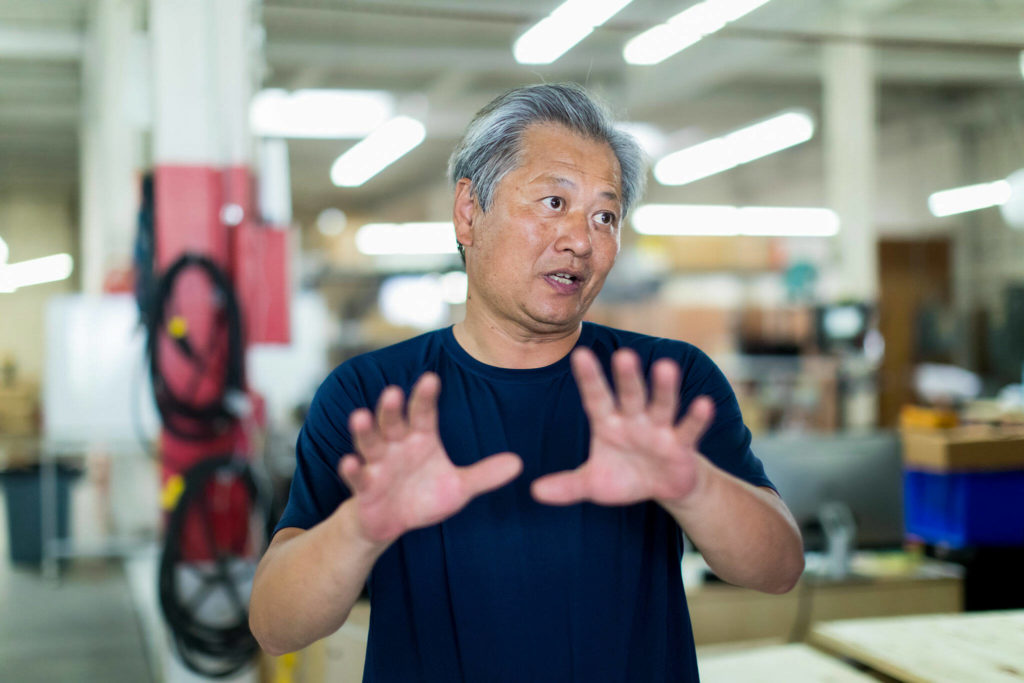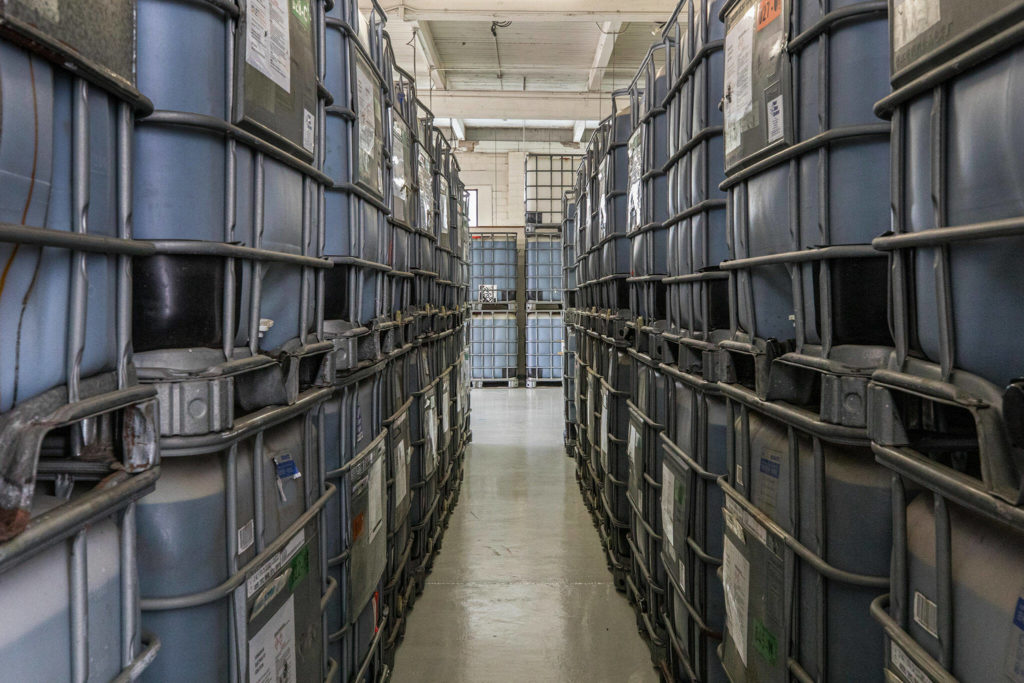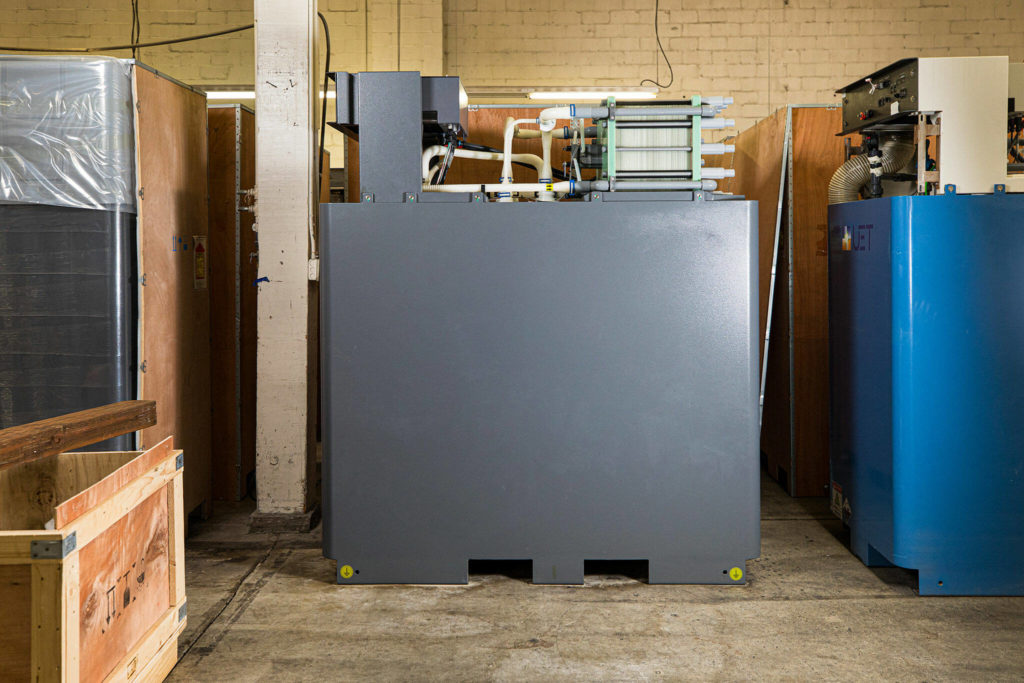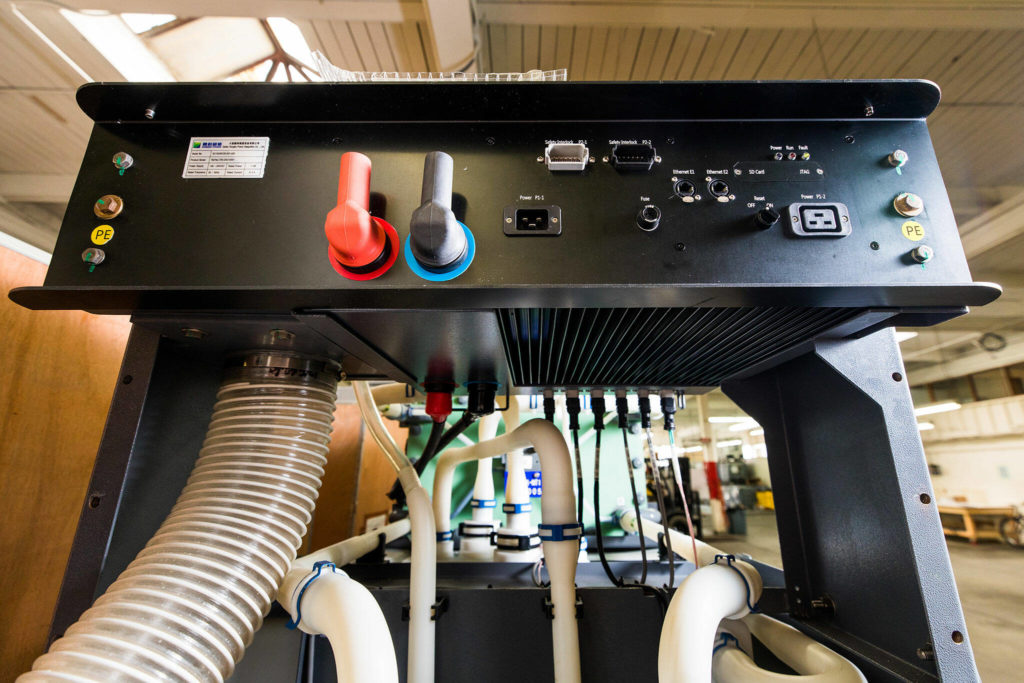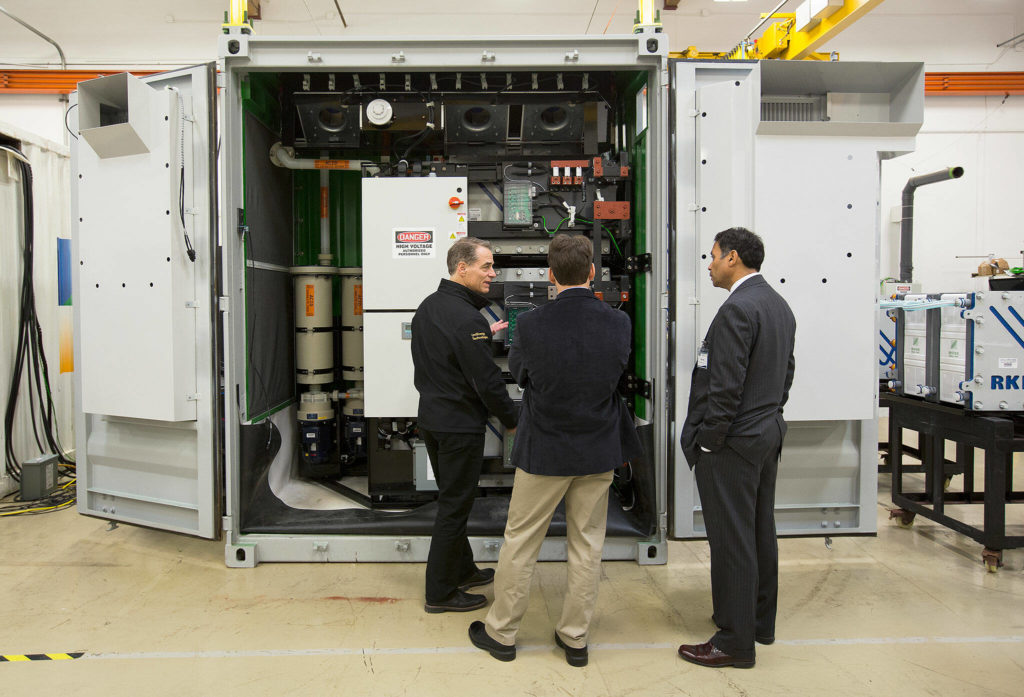By Zachariah Bryan / InvestigateWest
MUKILTEO — UniEnergy Technologies planned to do it all — build the battery of the future, create good American jobs, crack the code for clean energy.
Powered by a new chemical recipe cooked up in a taxpayer-funded federal lab, the private company’s 40-ton batteries promised to bridge the gap between wind and solar. They were designed to last for decades without degrading, unlike your laptop or phone, and wouldn’t catch fire. Politicians and reporters lined up to laud the innovation, boasting that it’d transform electricity.
“We love clean energy not just because it’s clean, but because it is jobs,” Gov. Jay Inslee told The Daily Herald, when he toured the company’s Mukilteo headquarters in 2017.
But despite millions in public funding, UniEnergy suddenly went dark last year, laid off its last employees and was forced to seek Chapter 11 protection under the U.S. Bankruptcy Code.
For all the support the company got, it had little to show for it other than a handful of shipping-container-sized batteries that sputtered out within a year, and some newer, smaller versions that never made it past the demonstration stage.
The company’s woes aren’t over. An aspiring competitor is calling out UniEnergy for offshoring jobs intended for American soil. And last month, National Public Radio scrutinized how the company “gave the technology to China,” prompting a strong rebuke from Florida Republican Sen. Marco Rubio.
“For far too long, the (Chinese Communist Party) has captured vital U.S. technology through illicit means and the carelessness of government agencies and businesses,” Rubio wrote in a letter to the Department of Energy.
The collateral damage left behind is far more extensive than previously reported, InvestigateWest has found. The company owes an estimated $35 million to employees, consultants, governments, investors and partner companies. Utility companies that bought batteries for upward of $12 million were left with shipping container-sized husks full of toxic chemicals. A landlord was saddled with an abandoned heap of lab equipment and over $317,000 in unpaid rent. An avocado farm that put up $468,000 got neither the batteries nor its money back.
“Deeply concerned” about how the company turned over American technology to China and other foreign entities, the Department of Energy is wrapping up a monthslong “formal review” of what happened. It’s also using UniEnergy as a case study in an expanded review that could have national implications for how publicly funded technology is licensed to the private sector in the future.
Indeed, it’s possible that UniEnergy stayed within the bounds of its agreement with the government, thanks to the vagueness of a 42-year-old law, the Bayh-Dole Act, which governs how technology licenses are managed. With new rules announced last year, the Biden administration is clamping down on what it calls loopholes in that law, and has signaled it wants to bring clean energy manufacturing jobs back home.
But first comes the review of UniEnergy’s epic rise and fall, which is not narrow in scope, officials say, but a “cradle to grave” examination that will take federal officials back to the company’s very beginnings.
Liquid energy
Born in the countryside of China’s Dalian peninsula, Gary Yang, 59 and now a U.S. citizen, came to America in the 1990s. He earned a Ph.D. at the University of Connecticut, did postdoctoral research at Carnegie Mellon and landed what he called a “cushy” job as a government scientist at the Pacific Northwest National Laboratory in Richland, about 200 miles southeast of Seattle.
Around 2007, Yang and others began researching vanadium redox flow batteries. Invented in the 1980s, the batteries harness a liquid solution called electrolyte to store and release energy.
Through years of trial and error, Yang’s team discovered a revolutionary cocktail of chemicals that could store twice as much energy as other vanadium batteries at the time. The Battelle Memorial Institute, a nonprofit that manages the national lab for the U.S. government, patented the invention in 2010.
The innovation caught the attention of a Chinese businessman, Yanhui Liu.
Liu formed a plan with Yang and another U.S. government scientist to sell a new battery. The businessman would become the majority owner in a new venture called UniEnergy Technologies, and his companies in China would supply the electrolyte and other components.
That arrangement made sense to Yang. China already had a supply chain in place. And as a scientist, he knew the chemistry but not how to make a full-on battery.
In 2012, Yang started UniEnergy and got from the government a “semi-exclusive” technology license, meaning only three businesses could use the federally researched electrolyte mix at a time.
UniEnergy had an advantage over the other licensed companies: a Chinese businessman willing to sink in over $72 million and a Japanese firm willing to pitch in another $12 million.
It wouldn’t matter, though. By the end it would all be gone.
System failure
Problems quickly arose at an electrical substation in Everett.
Bob Anderson, an engineering manager with the Snohomish County Public Utility District, said the utility district was supposed to run a series of tests on a set of UniEnergy batteries between July 2017 and August 2018. If something went wrong, a sensor would trip an alarm and shut the system down. Crews with UniEnergy would come out to fix the issue and return the battery to service.
When asked how many times the alarms went off, Anderson asked for clarification: “How many times a week?”
It seemed every component had malfunctioned. The fuel cells leaked acidic electrolyte. The pumps that moved the chemicals failed. Electrical wire corroded. Water got inside the container from rain and condensation.
They could barely get any testing done.
“When you can’t make it through a test three or four days long, that kind of gives you an idea of the frequency of these alarms and the system shutting down,” Anderson said. “It was very hard to get a continuous operation.”
Eventually, he said, UniEnergy representatives acknowledged that the battery system wasn’t going to work. They offered to take it away, recycle the electrolyte and provide a more reliable battery from a newer generation. They were obligated to give the Snohomish County utility district something that worked under warranty, Anderson said. But the district wanted to see a potential replacement work somewhere else first.
No one from UniEnergy ever came to take away the old batteries. The shipping containers are still sitting at the substation, holding nearly 100,000 gallons of hazardous waste. The utility district hopes to contract with someone to remove it sometime this year.
The system cost over $12 million. Over a third of that was paid by Washington’s Clean Energy Fund. The utility district footed the rest of the bill, with the help of ratepayers.
The grant also helped fund a $7 million UniEnergy project across the state in Pullman. That also was decommissioned within a year, according to an Avista Utilities spokesperson.
Bob Kirchmeier, a former utilities executive, helped start the state’s Clean Energy Fund and acted as an adviser for the program. He doesn’t regret that public money went to UniEnergy’s projects. Startup technology brings with it inherent risk, he said:
“If we’re collectively going to make this energy transition, pursue these audacious goals of decarbonization through the decades, sometimes we have to take risks, and sometimes there are failures,” he said.
UniEnergy’s shipping-container batteries ultimately went to California, Tennessee, New Mexico, New York, Hawaii, Germany and Italy.
As impressive as they looked, none of them work today.
‘Last gasp’
In 2017, Yang gave the Chinese company Rongke Power a sublicense to build a new line of batteries called ReFlex. Over the next few years, robotic arms at a factory in China put together about 100 of the batteries for about 10 sites around the world.
Sleeker and smaller — about the size of a fridge — the ReFlex was the “last gasp” for UniEnergy, said Rick Winter, who became CEO in 2018.
The more-compact battery design was a way to break into new markets that didn’t have space for shipping containers, like the skyscrapers of New York.
UniEnergy stopped assembly work in the United States. It was easier to transport the lighter ReFlex model as a whole unit, and the company had already been laying off employees to stay afloat, Winter said.
“Should I fire more of them so that I can build a production line that already exists in China?” he asked.
The decision to move all manufacturing to China strained the technology license’s condition that products be “manufactured substantially in the United States.”
It also didn’t sit well with some of the company’s Washington-based staff.
“It was U.S. taxpayer dollars that went to a DOE, government-owned facility for research to develop this IP (intellectual property) that had stipulations in its license agreements for U.S. sales, U.S. manufacturing, U.S. jobs and market support,” said Chris Howard, a former quality control engineer at UniEnergy who has since joined a competing company, Forever Energy.
Federal officials said they may soon publish a final report on their review of what happened with the taxpayer-funded vanadium electrolyte, along with a set of recommendations. According to the Department of Energy, the vanadium electrolyte is just one of many federal technologies that have been errantly sent overseas, causing the erosion of U.S. supply chains.
This much is known: The bulk of the ReFlex batteries were made and assembled in China. The pumps came from Germany. Nevertheless, Yang argues UniEnergy was in compliance. Researchers were still based in Mukilteo, he said. So were the engineers who made the battery management system. And some key components were sourced elsewhere in the country.
UniEnergy leaders struggled with the term “manufactured substantially,” which has roots in the 1980 Bayh-Dole Act, a bipartisan law meant to promote the commercialization of federal technology, with a preference for American jobs.
“There is a dearth of definition of what that phrase means,” said Chris Villani, UniEnergy’s legal counsel, who researched the subject after he came aboard in 2017. “It is all over the map.”
In a 2019 email exchange, Yang asked officials at the Pacific Northwest National Laboratory for clarification about what Rongke Power could do with its sublicense. Managers confirmed Rongke Power could build and sell batteries using the federal technology — and clarified that anything sold in the United States had to be substantially manufactured domestically.
Still, Winter said UniEnergy sent a ReFlex system to the national lab for testing, and there was no question it was made in China.
“They knew where that came from,” Winter said.
A dry well
During the pandemic, UniEnergy survived for a bit with a federal Paycheck Protection Program loan — almost $580,000 to keep afloat 26 workers. The company didn’t qualify for a second PPP loan due to its Chinese ownership.
Before that, one of the last loans UniEnergy got was in 2018 from Western Technology Inc., a California venture lending company, for $4 million. That quickly evaporated.
So did the money from their benefactors in China. The company’s primary investors had financial struggles back home, and UniEnergy wasn’t turning a profit.
Geopolitics had also turned sour.
“Who would think Trump would become president?” Yang said.
With the new president came a new trade war. A steep tariff on Chinese goods hamstrung any chance of selling the batteries in the United States.
No one else would give UniEnergy money. Layoffs followed layoffs followed layoffs. Winter watched the company’s employees dwindle from a height of 74 in 2017 to 11 in 2021, sparing a core team of researchers and engineers.
The company fell behind on rent as early as the summer of 2019 and stopped paying altogether in October 2020, according to court documents.
In a weekly meeting in 2019, Winter announced plans to move the U.S. team to China, to Rongke Power headquarters, for four months at a time. The investors agreed to pay the employees’ salaries if they crossed the Pacific Ocean. It was a way to keep them on the payroll as the company hemorrhaged money, Winter said.
The plan wasn’t fully realized. The U.S. employees were in China for only a few weeks before they returned, Winter said.
In early 2021, with the company racking up unpaid bills, a self-described “white knight” came into the picture: Craig Jones wanted to buy UniEnergy.
Jones, 56, had run JSM Construction, a real estate development company in Southern California. Around the turn of the millennium, he was credited with propping up downtown Santa Monica with mixed-use development. People opposed the buildings at the time, he said, but he didn’t care.
“I’m a disrupter,” Jones said. “I’m here to disrupt.”
As the housing market collapsed in the late aughts, he moved to Southeast Asia, leaving behind a snarl of broken contracts and lawsuits, with judgments against him totaling tens of millions of dollars. There he continued in real estate a while longer, until the pandemic hit. The way he tells it, he had a “COVID midlife crisis” and wanted to get into clean energy.
He came back to America, looking for a company in need. UniEnergy fit the bill. Jones toured the Mukilteo facility and met employees. In meetings, he scribbled his ideas on a whiteboard. He wanted to go residential. Anyone with a house could get a vanadium flow battery, he figured.
Jones and UniEnergy officials signed an agreement in April 2021. It suddenly blew up.
‘There was no plan’
On April 7, 2021, Western Technologies sent a notice of intent to sell UniEnergy’s collateral through a private sale. The company hadn’t made loan payments in nearly a year. The collateral included pretty much all of UniEnergy’s remaining assets, including its technology license.
On April 22, UniEnergy vacated its Mukilteo headquarters, leaving behind a mess of batteries and chemicals. The last 11 employees did not return to work.
“There was no plan,” said Villani, UniEnergy’s lawyer. “These guys are running around like chickens with their heads cut off, trying to figure out, ‘Oh my God, what are we doing now?’ It was a chaotic mess.”
David Wanek, CEO of Western Technologies, said in U.S. Bankruptcy Court that his firm searched for buyers, but they were knocking on all the same doors that UniEnergy had tried. Two candidates emerged: Jones’ Forever Energy and another new company, Vanadis Power.
Vanadis Power was formed in the Netherlands in 2020 to become UniEnergy’s European sales arm. Yang and Winter are listed on the website as founding members.
The head of Vanadis, Roelof Platenkamp, had a long career in the oil industry. He had offered to buy the assets alongside German industrialist Helmut Rebstock, the CEO of TGOOD Global, which makes prefabricated substations.
On Aug. 24, 2021, Western Technologies agreed to sell the assets to Vanadis, explaining they made the best offer and that Jones never demonstrated he had access to capital. The deal required just $273,000 upfront, with a few more million paid over time.
Jones called it a “totally bogus sale.” He said Western Technologies never gave him the time of day. He said Yang and Winter were trying to avoid debt and keep a federal invention out of American hands.
“This is just greedy old guys who screwed up and don’t want to give up,” he said.
Leading up to the sale, the national lab gave the go-ahead to move the technology license to Vanadis Power.
Citing client confidentiality, lab officials would not comment on how much they knew about Vanadis Power, where it was located or its plans to keep partnering with Chinese businesses.
When the deal with Forever Energy fell apart, Jones went on the offensive, warning the national lab that UniEnergy was out of compliance with its license and reaching out to journalists to do an investigative story.
Jones also led the effort to force UniEnergy into involuntary bankruptcy. According to court documents, Jones rounded up potential creditors and paid for attorneys’ fees. In Bankruptcy Court, lawyers claimed the sale to Vanadis Power amounted to a fraudulent transfer of assets. The judge said the argument had, by initial appearances, “a foot in the door.”
In May of this year, a federal judge ordered UniEnergy Technologies into bankruptcy, converting the case to Chapter 7 to liquidate the company’s assets.
In June, the national lab terminated Vanadis Power’s technology license for not paying royalty fees and not reaching other milestones.
The ReFlex assembly line in China, meanwhile, has gone dark, Yang said.
Die trying
Whatever takes UniEnergy’s place, if anything does, it might struggle to maintain the same Chinese connections. Though Trump is no longer president, some of his trade policies are intact.
Last year the Department of Energy announced new federal technology license rules, called the “U.S. Competitiveness Provision,” amending the Bayh-Dole Act. Under the rules, all federal technology licenses, including nonexclusive ones, now come with the requirement for products to be substantially manufactured in the United States. That also applies to products sold internationally, which were previously exempt.
Moreover, the department is requiring written notice of any change in ownership or license transfer, to try to keep foreign entities from swooping in to buy up American innovations.
“If these companies have benefited from taxpayer investments and then turned around and moved these jobs overseas, I am just really upset about that, and you should be, too,” Energy Secretary Jennifer Granholm said in a video.
As for Forever Energy, a spokesperson said the company got a temporary technology license for the electrolyte and is seeking a permanent one. Jones envisions employing thousands of people at a factory near Shreveport, Louisiana. To make that happen, Forever Energy’s website says the company is applying for a $1.6 billion Department of Energy loan. That would be one of the larger sums of money given out in the department’s history.
Jones said he still believes something like the ReFlex could work.
“We’re going to die trying,” he said.
Meanwhile, Yang and Winter registered a new company in Washington last year. They named it Enduro. They say they have a client, but won’t divulge who it is or what the product will look like. They did say they’re applying for another technology license for the mixed-acid electrolyte that Yang helped invent.
As bankruptcy proceedings march forward, the new company is also holding some of UniEnergy’s former assets in a nondescript warehouse in Seattle. During a recent interview, Winter motioned to a line of dormant ReFlex batteries and lamented UniEnergy’s demise.
“What we really hold on to is that we truly did develop and deliver an amazing product and it’s sitting right there,” he said. “And what makes it a little more frustrating is that we sort of ran out of steam just at the wrong moment.”
InvestigateWest (invw.org) is an independent news nonprofit dedicated to investigative journalism in the Pacific Northwest. Visit invw.org/newsletters to sign up for weekly updates.
Talk to us
> Give us your news tips.
> Send us a letter to the editor.
> More Herald contact information.
